Discover Different Types of Bath Towels for Ultimate Comfort
Industry Trends and Market Dynamics in Technical Textiles
The global market for technical textiles, particularly within the hospitality, healthcare, and wellness sectors, is experiencing significant evolution. Decision-makers and procurement specialists increasingly prioritize products that not only offer superior performance but also align with sustainability mandates and stringent quality controls. Understanding the different types of bath towels available, from their material composition to their manufacturing intricacies, is crucial for optimizing operational efficiency and enhancing user experience.
Current industry trends highlight a surge in demand for eco-friendly materials, advanced fabric technologies, and customized solutions. Sustainable options like organic cotton, bamboo, and recycled fibers are gaining traction, driven by corporate social responsibility initiatives and consumer preference. Simultaneously, innovations in weaving and finishing processes are yielding towels with enhanced absorbency, quicker drying times, and improved durability, directly addressing the high-volume laundry cycles prevalent in commercial environments. The integration of antimicrobial treatments and smart textile functionalities, while nascent, signifies a future direction for specialized applications requiring stringent hygiene protocols.
Technical Specifications and Material Science of Different Types of Bath Towels
The performance characteristics of a bath towel are fundamentally determined by its material composition, yarn type, and weave structure. A comprehensive understanding of these technical parameters is essential for selecting the optimal product for specific B2B applications.
Primary Material Categories:
- Cotton: Renowned for its natural absorbency and softness.
- Egyptian Cotton: Characterized by extra-long staple fibers, yielding highly absorbent, durable, and exceptionally soft towels. Ideal for luxury hotels.
- Pima Cotton (Supima): Similar to Egyptian cotton in fiber length and quality, offering excellent strength and softness.
- Turkish Cotton: Known for its longer, fewer fibers, resulting in a naturally flat weave that becomes softer and more absorbent over time. Favored for its balance of absorbency and quick-drying properties.
- Upland Cotton: The most common type, with shorter fibers. While less luxurious, it offers good value for general-purpose use.
- Bamboo: A sustainable fiber known for exceptional softness, natural antimicrobial properties, and high absorbency. Blends with cotton are common to enhance durability.
- Microfiber: Synthetic blend (typically polyester and polyamide) offering rapid drying, lightweight construction, and excellent lint-free cleaning capabilities. Primarily used for specialized tasks or sports.
- Linen: Durable and highly absorbent, linen towels are more textured and offer excellent exfoliation. They dry quickly and are known for longevity.
Key Technical Parameters:
- Grammage (GSM - Grams per Square Meter): This metric indicates the towel's density and weight. Higher GSM (e.g., 400-900 GSM) generally corresponds to greater absorbency, plushness, and durability, making it suitable for luxury segments. Lower GSM (300-400 GSM) towels are lighter, quicker-drying, and more economical for high-turnover uses.
- Yarn Type:
- Ring-Spun: Yarns are made by continuously twisting and thinning cotton fibers, creating a stronger, smoother, and softer yarn.
- Combed Cotton: Fibers are combed to remove short strands and impurities, resulting in a finer, stronger, and more lustrous yarn.
- Zero-Twist/Low-Twist: Yarns are made with minimal or no twist, using special spinning techniques or PVA fibers that dissolve during finishing. This creates exceptionally soft, fluffy, and highly absorbent towels due to greater surface area.
- Weave Structure (Pile Type):
- Terry Cloth: The most common, characterized by uncut loops that maximize surface area for absorbency. Loop height and density affect absorbency and plushness.
- Waffle Weave: Creates a distinctive grid pattern that increases surface area and promotes airflow, leading to faster drying times.
- Velour: Terry loops are shorn on one side, creating a smooth, soft, velvety surface. While luxurious, it reduces absorbency on the velour side.
Product Specification: AquaSoft Pure Cotton Bath Towel 480gsm
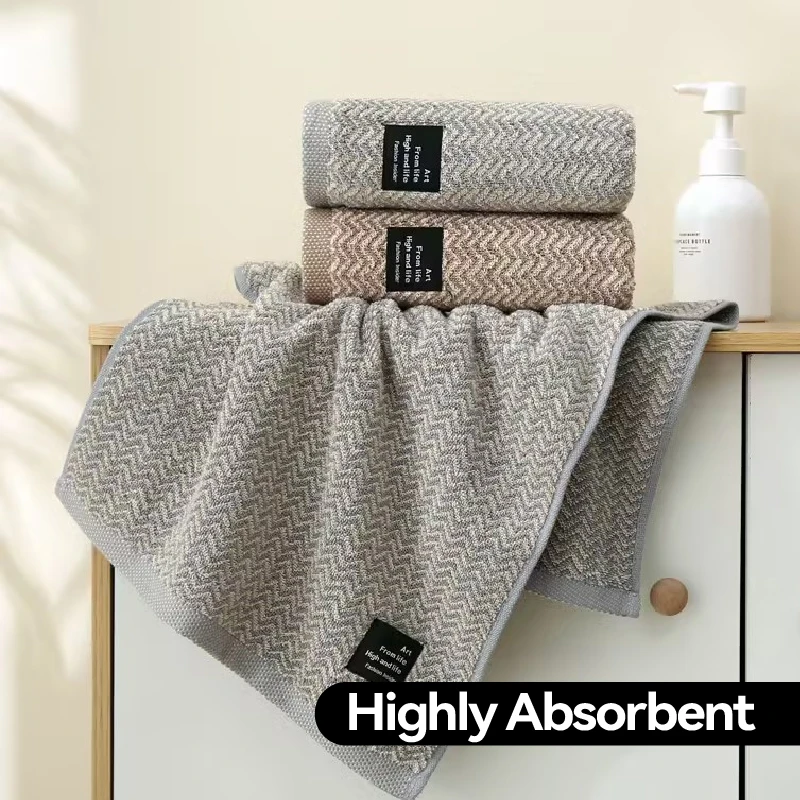
Manufacturing Process Flow for Quality Bath Towels
The production of high-quality bath towels, including the various specific different types of bath towels, involves a meticulously controlled multi-stage process, ensuring consistent quality, durability, and performance. Our manufacturing adheres to strict international standards such as ISO 9001 for quality management and OEKO-TEX Standard 100 for textile safety.
Schematic Process Steps:
- Fiber Sourcing & Ginning: Raw cotton, typically long-staple varieties, is meticulously sourced from certified growers. After harvesting, ginning separates the cotton fibers from seeds and debris, followed by initial cleaning to remove coarse impurities. This stage is crucial for ensuring the foundational quality of the yarn.
- Carding & Combing:
- Carding: Fibers are aligned parallel to each other and cleaned further, forming a continuous rope-like strand called a sliver.
- Combing (for premium towels): The sliver undergoes a combing process to remove any remaining short fibers and align the long fibers more perfectly, resulting in a smoother, stronger, and more lustrous yarn, which is vital for high-end bath towels.
- Spinning: The prepared fibers are spun into yarn. Ring-spinning is commonly used for quality bath towels due to its ability to produce stronger, finer, and softer yarns compared to open-end spinning. The yarn count (e.g., Ne 16/1, Ne 20/2) is selected based on desired towel weight and texture.
- Warping & Weaving:
- Warping: The spun yarn is wound onto large beams to create the warp (longitudinal) threads for the loom.
- Weaving: High-speed shuttleless looms (e.g., rapier or air-jet looms) are employed to weave the terry fabric. This process creates the characteristic loop pile, crucial for absorbency. Specialized dobby or jacquard attachments can be used to weave decorative borders or integrated logos.
- Dyeing & Bleaching:
- Bleaching: Greige (unprocessed) fabric is thoroughly bleached to achieve a pure white base, removing natural impurities and preparing it for dyeing.
- Dyeing: Fabric is dyed using reactive or vat dyes in large vats or continuous dyeing ranges, ensuring excellent colorfastness (typically Grade 4-5 as per AATCC standards) against washing, light, and chlorine. Precise temperature and chemical controls prevent corrosion or degradation of fibers.
- Finishing: This stage enhances the towel's aesthetic and functional properties.
- Softening: Application of fabric softeners for desired hand-feel.
- Hydrophilic Treatment: Ensures rapid water absorption.
- Shearing/Napping (if applicable): For velour finishes, loops are precisely cut.
- Drying & Sanforizing: Fabric is dried, and sanforizing (pre-shrinking) minimizes subsequent shrinkage during laundry cycles, extending service life.
- Cutting & Sewing: The finished fabric is cut to specified dimensions, and hems are double-stitched using robust lock-stitching or overlock machines to prevent fraying and withstand industrial laundering.
- Quality Control & Packaging: Each towel undergoes final inspection for defects, weight consistency, and compliance with specifications. Products are then neatly folded, branded if required, and packaged for shipment.
This comprehensive process ensures that our towels not only meet but exceed the performance expectations for service life, energy saving (through optimized drying), and robust resistance in typical application scenarios such as hospitality laundry systems.
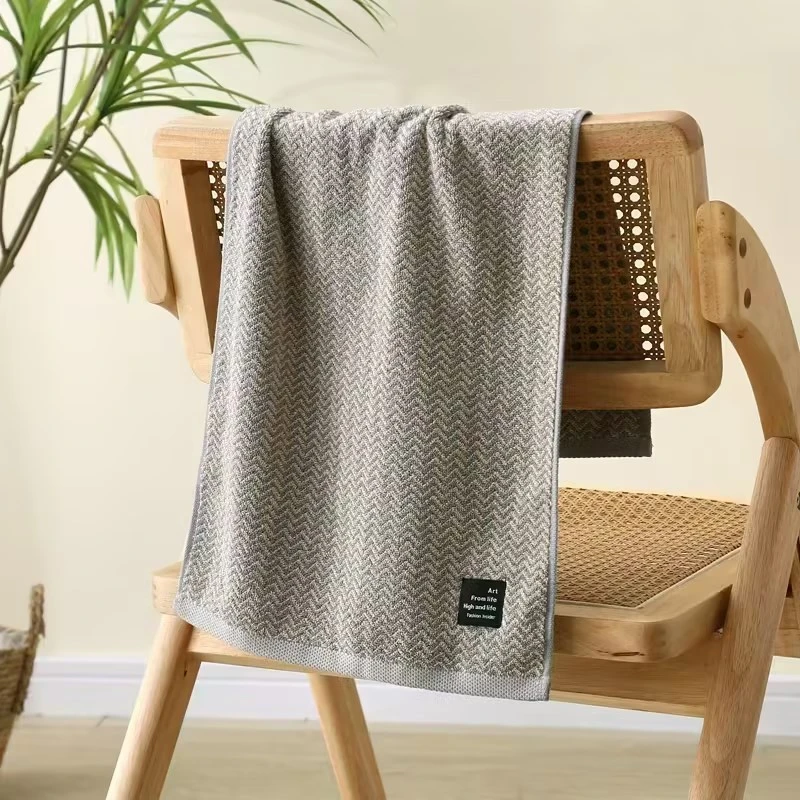
Application Scenarios and Technical Advantages for Various Different Types of Bath Towels
The selection of appropriate bath towels is highly dependent on the specific industry and intended use. Different towel types offer distinct advantages tailored to demanding commercial environments.
Target Industries and Applications:
- Hospitality (Hotels, Resorts, Guesthouses): This sector demands high-quality, durable, and aesthetically pleasing towels that can withstand frequent industrial laundering while maintaining softness and absorbency. Different types of towels in hotel settings vary from luxurious Egyptian or Pima cotton for 5-star establishments to robust Upland cotton blends for economy hotels. The AquaSoft Pure Cotton 480 GSM is an exemplary choice for its balance of plushness and resilience, ensuring guest satisfaction and prolonged service life.
- Spa & Wellness Centers: Here, the focus is on a luxurious feel, high absorbency, and quick-drying properties. Zero-twist or low-twist cotton towels and bamboo blends are preferred for their unparalleled softness and superior absorbency, enhancing the client experience. The ability to dry quickly also contributes to energy saving in laundry operations.
- Healthcare Facilities (Hospitals, Clinics, Aged Care): Durability, ease of sterilization, and resistance to harsh chemicals are paramount. White, high-GSM cotton towels that can withstand high-temperature washing and bleach without significant degradation or color loss (corrosion resistance) are essential. Hypoallergenic and OEKO-TEX certified options are also crucial for patient safety.
- Sports & Fitness Centers: Microfiber towels are highly favored due to their quick-drying capabilities, lightweight nature, and high absorption, making them ideal for gym-goers and athletes. Cotton towels for general use are also common, prioritizing durability.
Technical Advantages:
- Enhanced Service Life: Reinforced hems, high-quality ring-spun yarns, and a dense weave structure contribute to a significantly longer product lifespan, reducing replacement frequency and procurement costs. Our AquaSoft towels are tested for over 200 industrial washes without significant degradation.
- Energy Saving: Towels with optimized absorbency and quick-drying properties (e.g., lower-twist cottons, waffle weaves, microfiber) reduce energy consumption during washing and drying cycles, leading to substantial operational cost savings for large-scale users.
- Corrosion Resistance & Colorfastness: Advanced dyeing techniques utilizing reactive dyes ensure superior color retention and resistance to chlorine and other harsh chemicals commonly used in commercial laundering. This prevents premature fading and maintains a professional appearance.
- Hygienic Performance: OEKO-TEX Standard 100 certification guarantees that towels are free from harmful substances, promoting user safety. The ability to withstand high-temperature washing effectively sanitizes the towels for repetitive use in health-sensitive environments.
- Softness & Comfort: The use of combed, long-staple cotton and optimized loop construction provides a luxurious hand-feel, enhancing guest or client comfort and satisfaction.
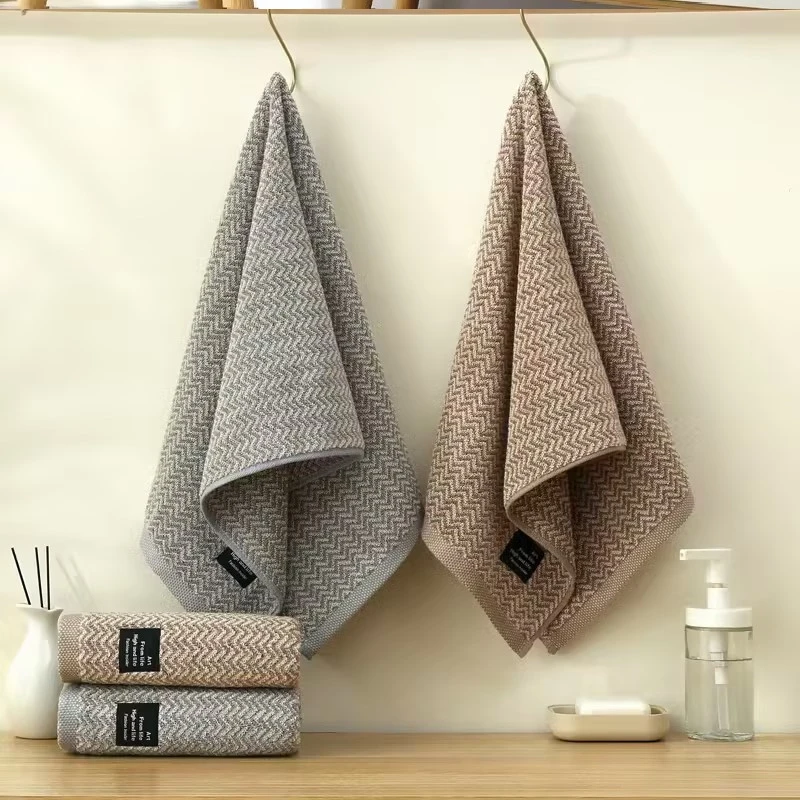
Vendor Comparison: Selecting the Right Partner for Your Textile Needs
When procuring different types of bath towels for commercial use, a thorough vendor comparison is crucial. Beyond initial cost, factors such as material quality, manufacturing consistency, supply chain reliability, and after-sales support significantly impact total cost of ownership and operational efficiency. Here’s a comparative overview of key criteria:
Choosing a specialist B2B textile manufacturer like Longshow Textile, with decades of experience and a strong commitment to quality, translates into a superior product, greater operational reliability, and a lower total cost of ownership for your enterprise. Our focus on different types of towels material ensures tailored solutions for diverse commercial needs.

Customized Solutions for Kinds of Towel
Recognizing that every B2B client has unique requirements, specialized manufacturers offer extensive customization capabilities for various kinds of towel. These tailored solutions ensure that the products perfectly align with brand identity, operational demands, and budget constraints.
Key Customization Options:
- Material Composition: Clients can specify precise blends (e.g., cotton-bamboo, cotton-polyester for added durability) or request specific grades of cotton (e.g., 100% long-staple Turkish cotton).
- GSM and Pile Height: Tailoring the grammage and loop height to achieve desired absorbency, plushness, and drying speed. For instance, a luxury spa might opt for 700+ GSM, while a busy gym may prefer a 400 GSM quick-dry option.
- Size and Dimensions: Custom dimensions for bath sheets, hand towels, face cloths, or specific spa wraps.
- Color Matching: Precise Pantone color matching to align with corporate branding guidelines, ensuring consistency across all textile products.
- Branding Integration:
- Embroidery: High-quality, durable embroidery of logos, names, or designs.
- Jacquard Weaving: Integrating logos or patterns directly into the towel's weave for a sophisticated and permanent brand presence.
- Dobby Borders: Custom-designed borders adding a distinctive touch to the towel's aesthetic.
- Special Finishes and Treatments: Options such as antimicrobial treatments, enhanced quick-dry properties, or extra-soft finishes to meet specific functional requirements.
- Packaging: Customized packaging solutions, including individual poly-bags, branded inserts, or bulk packaging designed for efficient storage and distribution.
Working with a flexible manufacturer ensures that custom requirements, including minimum order quantities (MOQs), can be met efficiently, providing a distinct competitive advantage in the market.
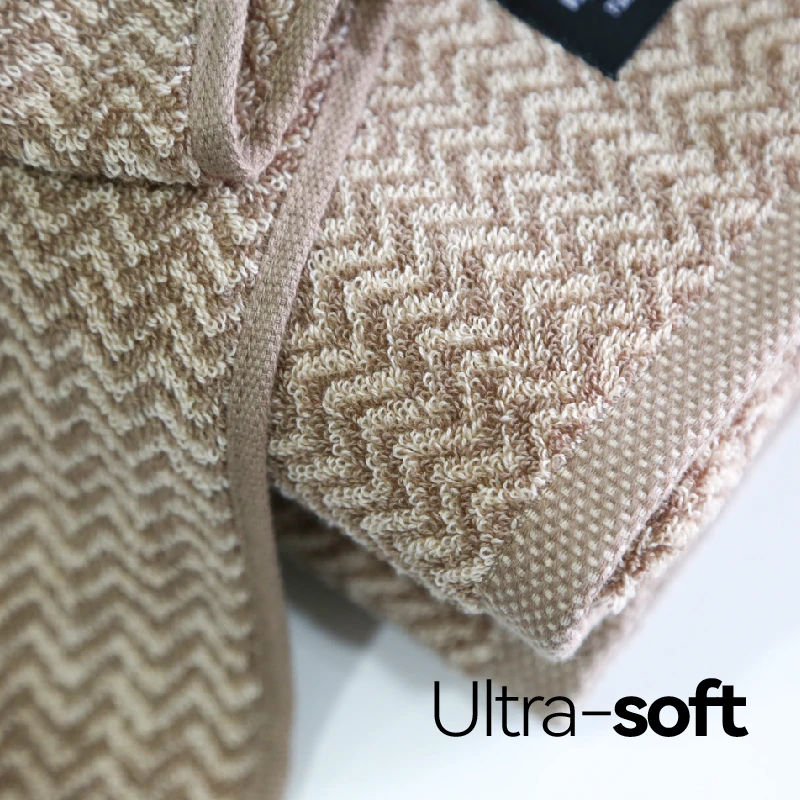
Application Case Studies: Real-World Impact and Client Success
Our commitment to quality and technical excellence is demonstrated through successful partnerships across diverse sectors. These case studies highlight the tangible benefits clients achieve by investing in high-performance bath towels.
Case Study 1: Luxury Hotel Chain - Elevating Guest Experience and Operational Efficiency
Client: "Grandeur Hospitality Group," a chain of five-star hotels operating across major global cities.
Challenge: The client sought to upgrade their guest room amenities, specifically bath towels, to match their brand's luxury positioning. Previous suppliers offered inconsistent quality, leading to premature wear and negative guest feedback regarding softness and absorbency. They needed a towel that could withstand intensive industrial laundering (150+ cycles) while maintaining a plush feel and vibrant white color.
Solution: We supplied custom-designed 600 GSM Egyptian Cotton bath towels, featuring a unique jacquard-woven logo and reinforced double-stitched hems. The towels were OEKO-TEX certified and processed with advanced dyeing for superior colorfastness and bleach resistance.
Results:
- Guest satisfaction scores for in-room amenities increased by 18% within six months.
- Towel replacement rates decreased by 35% annually, directly attributable to enhanced durability and resistance to wear and tear.
- Laundry operational costs reduced by 10% due to optimized drying times and less need for re-washing due to staining.
Client Feedback: "The investment in these premium towels from Longshow Textile has paid dividends, not just in tangible savings but more importantly, in elevating our brand reputation and exceeding guest expectations. The quality is simply unparalleled." - Director of Procurement, Grandeur Hospitality Group.
Case Study 2: National Healthcare Provider - Ensuring Hygiene and Durability in Critical Environments
Client: "VitalCare Health Systems," a network of hospitals and clinics requiring high-volume, hygienically superior patient care textiles.
Challenge: The client needed bath towels that could withstand extreme washing temperatures and harsh disinfectants without degrading, discoloring, or losing absorbency. Consistency in supply and compliance with health regulations were critical. Their previous supplier's towels showed rapid deterioration and yellowing.
Solution: We provided 450 GSM pure white, 100% cotton towels specifically engineered for institutional laundering. These towels featured a tighter weave, highly resilient yarn, and were treated for maximum chlorine resistance and anti-pilling properties. They were manufactured under ISO 9001 quality standards and guaranteed to be free from harmful substances (OEKO-TEX certified).
Results:
- Achieved consistent hygiene standards, passing all internal audits for textile cleanliness and structural integrity after repeated sanitization cycles.
- Reduced annual procurement spend by 20% due to the extended service life of the towels, lasting twice as long as previous products.
- Improved patient comfort with consistently soft and absorbent towels, positively impacting patient experience scores.
Client Feedback: "For critical healthcare environments, reliability and hygiene are non-negotiable. Longshow Textile delivered towels that not only meet our stringent requirements but surpass them in durability and performance. A truly trustworthy partner." - Head of Facilities Management, VitalCare Health Systems.
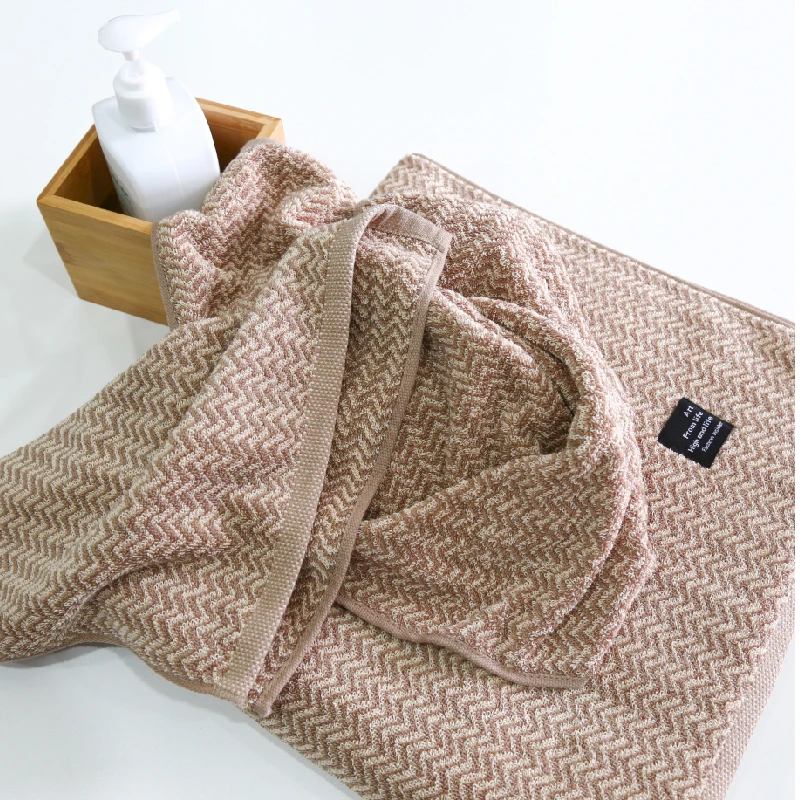
Trustworthiness and Support: Your Partner in Textile Solutions
Building long-term B2B relationships is founded on trust, transparency, and reliable support. We are committed to providing comprehensive information and dedicated services to ensure complete client satisfaction.
Frequently Asked Questions (FAQ)
- Q: What is the typical lead time for large orders of different types of bath towels?
A: Standard lead time for custom production orders typically ranges from 30-45 days after deposit and final sample approval. For in-stock items, shipping can occur within 7-10 business days. - Q: Do you offer samples for evaluation?
A: Yes, we provide samples for quality assessment. Stock samples can be shipped immediately, while custom samples may incur a small fee and require a short production time. - Q: What are your minimum order quantities (MOQ)?
A: MOQs vary depending on the product type, material, and customization requirements. Typically, for custom bath towels, MOQs start from 1,000-2,000 pieces per color/size. Please contact our sales team for specific details. - Q: How do you ensure color consistency across different production batches?
A: We utilize advanced spectrophotometry for precise color matching and adhere to strict dyeing protocols (AATCC standards) to ensure minimal variation (Delta E < 1.0) across all production runs.
Lead Time & Fulfillment Details
Our robust supply chain and manufacturing capabilities enable efficient order fulfillment. We maintain a clear communication channel throughout the production process, providing regular updates on order status. Expedited services may be available for urgent requirements, subject to production capacity. Shipping logistics are managed by experienced professionals, ensuring timely and secure delivery to your specified location, globally.
Warranty Commitments
We stand by the quality of our products. All our bath towels come with a standard 1-year warranty against manufacturing defects. This covers issues related to material integrity, stitching, and colorfastness under normal commercial use and recommended washing instructions. For any verified defects, we offer prompt replacement or credit, ensuring minimal disruption to your operations. Our OEKO-TEX and ISO certifications further underscore our commitment to product excellence.
Dedicated Customer Support
Our dedicated B2B customer support team is available to assist you from initial inquiry to post-delivery. Each client is assigned a dedicated account manager who understands your specific needs and provides personalized service. You can reach us via phone, email, or our online portal for technical inquiries, order tracking, or any after-sales assistance. Our commitment is to foster a partnership built on reliability and mutual success.
References
- Textile Exchange. (2023). Material Market Report. Retrieved from www.textileexchange.org
- International Organization for Standardization. (2022). ISO 9001:2015 Quality management systems – Requirements. Retrieved from www.iso.org
- OEKO-TEX Association. (2023). STANDARD 100 by OEKO-TEX. Retrieved from www.oeko-tex.com
- American Association of Textile Chemists and Colorists. (2021). AATCC Technical Manual. Retrieved from www.aatcc.org
-
Garment Washed Sheets Color Retention Prevents Fading After WashesNewsNov.14, 2025
-
Charcoal Bamboo Sheets Moisture-Wicking Property Enhances Sleep ComfortNewsNov.12, 2025
-
High Quality Satin Sheets Soft Touch Improves Hotel Guest ExperienceNewsNov.12, 2025
-
Poly Cotton Sheets Breathable Weave Reduces Skin Irritation For PatientsNewsNov.12, 2025
-
Microfiber Sheet Stain Resistant Feature Eases Hotel HousekeepingNewsNov.12, 2025
-
Polyester Cotton Bedding Durable Fabric Withstands Frequent Hotel WashesNewsNov.12, 2025
-
Microfiber Pillow Filling Even Distribution Prevents LumpingNewsNov.03, 2025






